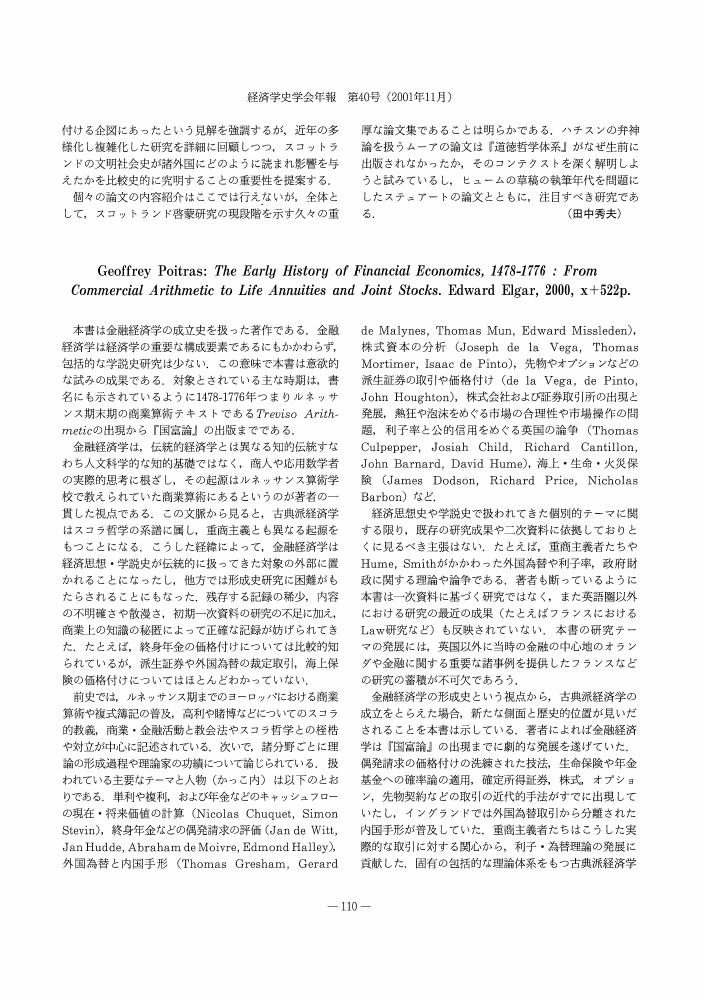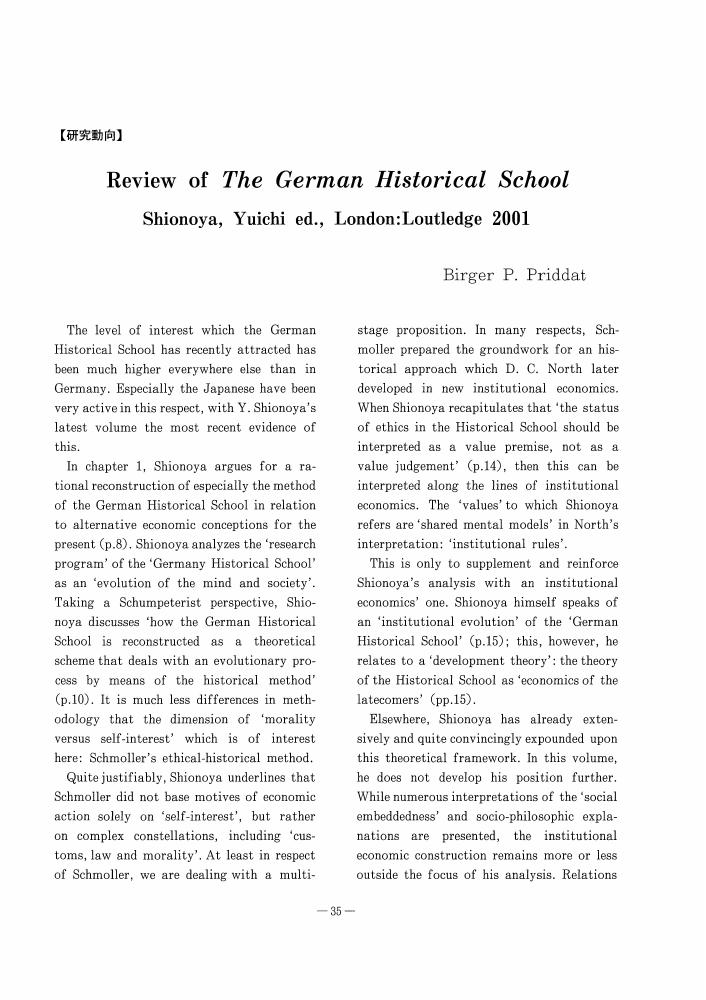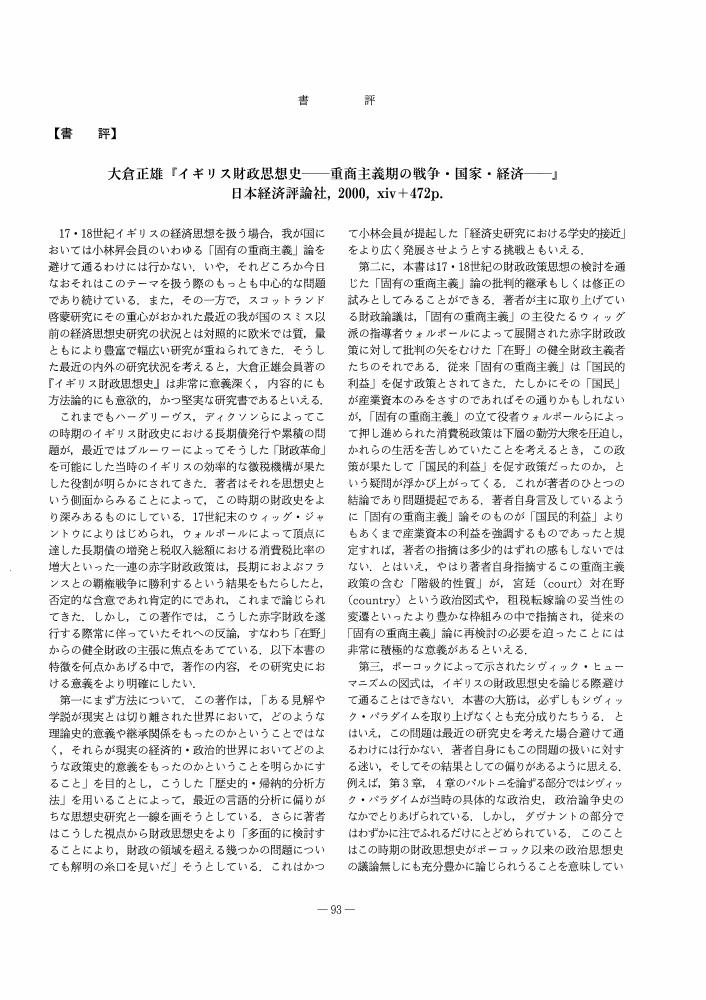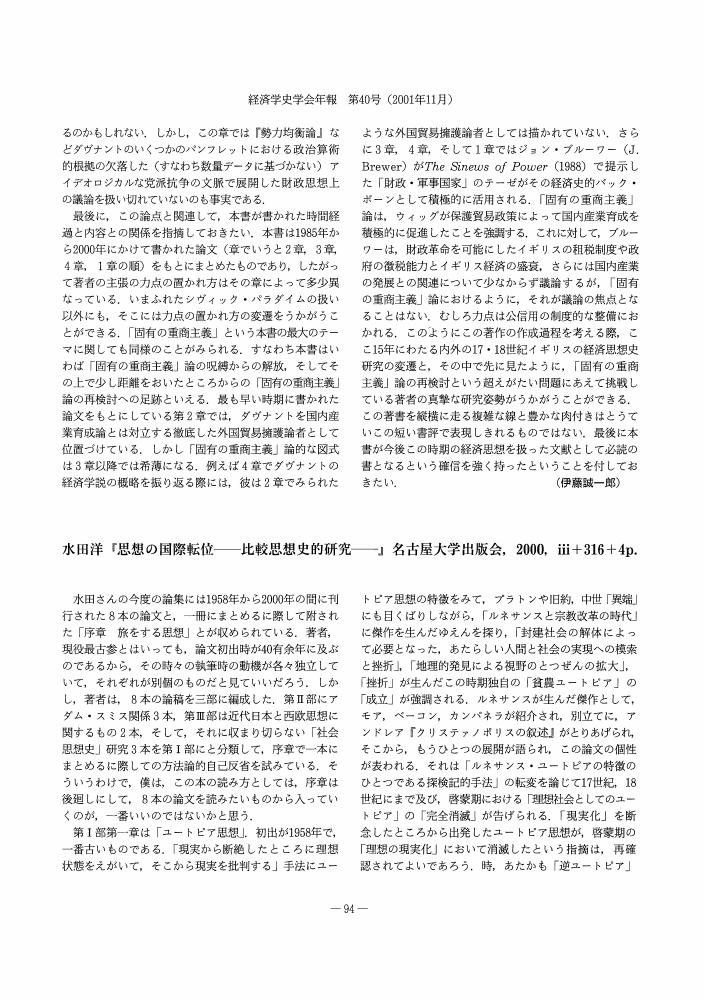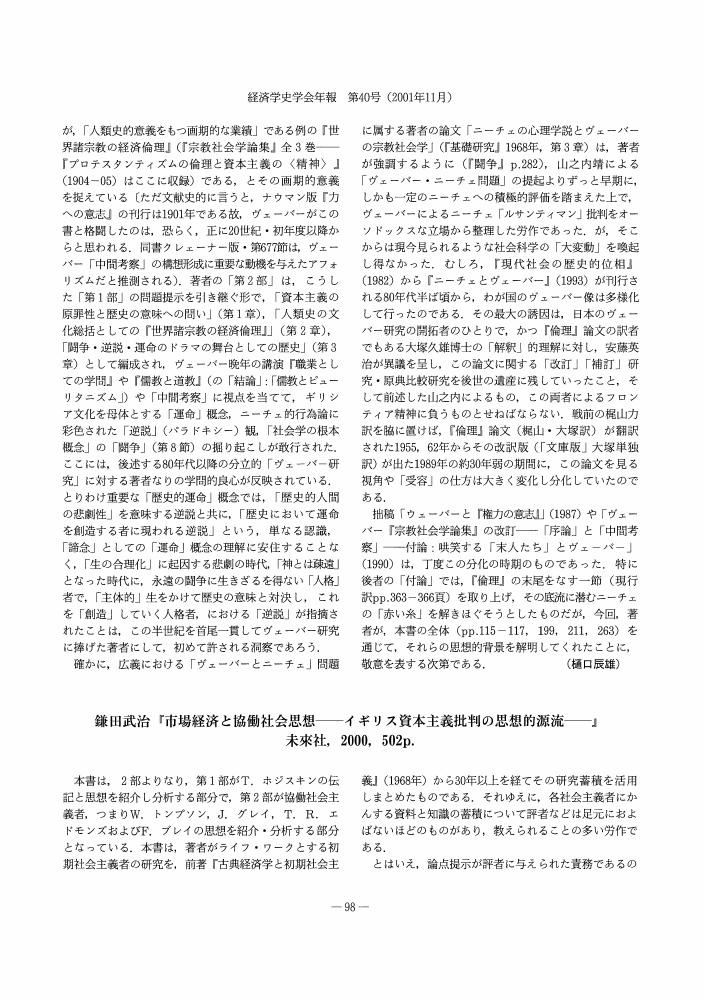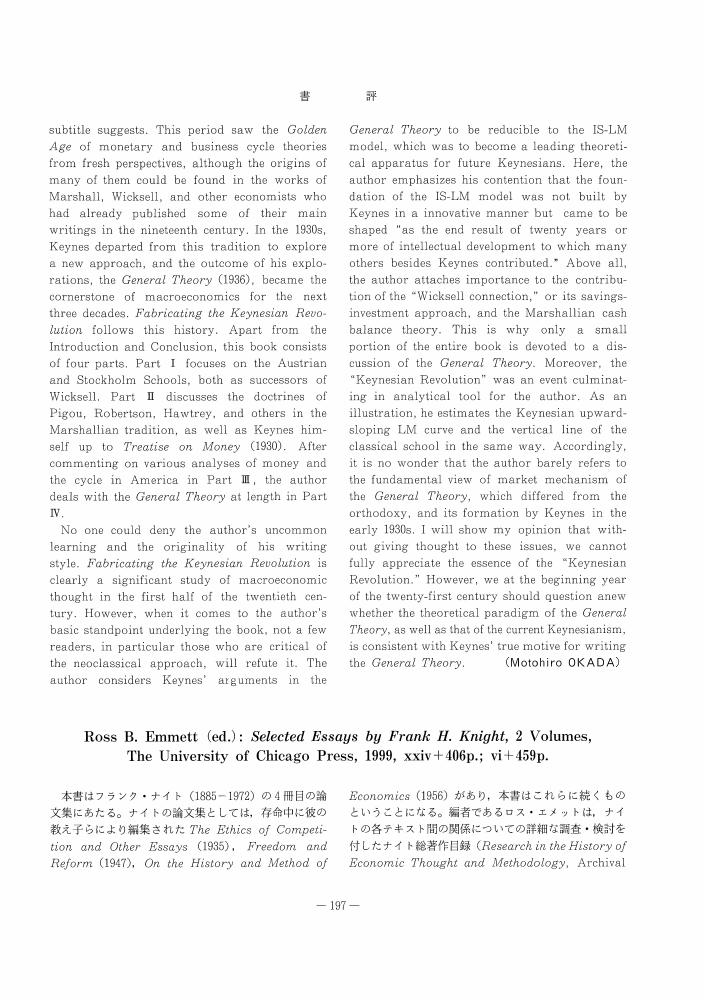- 著者
- 二階堂 達郎
- 出版者
- The Japanese Society for the History of Economic Thought
- 雑誌
- 経済学史学会年報 (ISSN:04534786)
- 巻号頁・発行日
- vol.40, no.40, pp.110-111, 2001 (Released:2010-08-05)
- 著者
- Birger P. Priddat
- 出版者
- The Japanese Society for the History of Economic Thought
- 雑誌
- 経済学史学会年報 (ISSN:04534786)
- 巻号頁・発行日
- vol.40, no.40, pp.35-42, 2001 (Released:2010-08-05)
1 0 0 0 OA フランク・ナイトにおける企業者と競争的経済秩序
- 著者
- 黒木 亮
- 出版者
- The Japanese Society for the History of Economic Thought
- 雑誌
- 経済学史学会年報 (ISSN:04534786)
- 巻号頁・発行日
- vol.40, no.40, pp.43-55, 2001 (Released:2010-08-05)
- 参考文献数
- 50
The thrust of this paper is to ascertain the theoretical base of Knight's critical writings in social science, and to search out fundamentals of his pluralistic thought, by reconstructing his theory of profit in Risk.The point of Risk is comprised in three statements: (1) Suggestions by advocates of laissez-faire policy on the market price theory require the implicit assumption of perfect knowledge; (2) Estimates made by those who have only imperfect knowledge produce some significant effects on a real and uncertain world; (3) Profits accrue to the entrepreneur who makes the responsible estimate from its margin of error, real uncertainty.The intention of Knight in developing his theory was to placard the unrealities of postulates of theoretical economics for the purpose of making clear the limitations of economics, and for establishing its dignity as an exact science. He therefore proceeded to insist on the necessity of rapprochement between economics and the other social sciences, especially ethics, in order to debate the desirable social order or social betterment.Thus, Risk not only formed the solid ground of Knight's methodological discussion about social philosophy, but also laid the foundation of modern American economics.
1 0 0 0 OA J. -B. セーの経済学認識
- 著者
- 高橋 信勝
- 出版者
- The Japanese Society for the History of Economic Thought
- 雑誌
- 経済学史学会年報 (ISSN:04534786)
- 巻号頁・発行日
- vol.40, no.40, pp.56-68, 2001 (Released:2010-08-05)
- 参考文献数
- 33
This paper explains how J. -B. Say's recognition of political economy involves not only economic phenomena in the strict sense, but also the institutional factors which constitute market society, i. e., property and rational agents. According to Say, political economy was due to discover “nature des choses” by adapting the experimental method, and this perspective differs from Ricardo's counterpart, which contains abstruse deduction. Revealing the main contents of “nature des choses” about the socioeconomic sphere enables us to reinterpret the political economy in Say's design. The factors he considered are as follows: (1) the decisive importance of property and thus ownership, because the existence of a certain society depends on them; (2) “principe de l'utilité” as a criterion utilized by rational agents; (3) several laws regarding exchange that ultimately represent the production, distribution and consumption of social wealth, (4) “théorie des débouchés” which is useful to scale to what extent the above-mentioned factors are soundly united. Therefore, Say's recognition of political economy is more wide-ranged than commonly supposed. As long as political economy is grasped in his thinking on the basis of “nature des choses” about the socioeconomic sphere, Say could not help but be induced to analyze the conditions and automotive characteristics inherent in a market society. Proposing that political economy should be called social economy, Say expressed his profound intentions.
1 0 0 0 OA ハロッドの必要資本概念について
- 著者
- 難波 安彦
- 出版者
- The Japanese Society for the History of Economic Thought
- 雑誌
- 経済学史学会年報 (ISSN:04534786)
- 巻号頁・発行日
- vol.40, no.40, pp.69-80, 2001 (Released:2010-08-05)
- 参考文献数
- 18
It is a commonly accepted theory that Harrod's dynamics is not based on microeconomic theory. Namba (2000) objected to the theory and showed a new interpretation suggesting that Harrod's dynamics has a microeconomic foundation.The purpose of this article is to clarify that the required capital coefficient is related to behaviors of dynamic optimization of firms.There are two points presents in this article. First, the concept of required capital coefficient after Harrod (1939) has relation to the capital capital coefficient in the Trade Cycle, and the capital coefficient is connected to behaviors of dynamic optimization of firms. Second, the concept of required capital coefficient after Harrod (1939) is closely related to behaviors of dynamic optimization of firms, and is therefore related to the interest rate.
1 0 0 0 OA J. A. ホブソンの新自由主義と過少消費説
- 著者
- 八田 幸二
- 出版者
- The Japanese Society for the History of Economic Thought
- 雑誌
- 経済学史学会年報 (ISSN:04534786)
- 巻号頁・発行日
- vol.40, no.40, pp.81-92, 2001 (Released:2010-08-05)
- 参考文献数
- 37
In his Confessions of an Economic Heretic (1938), J. A. Hobson emphasized the positive meaning of equality in the stream of New Liberalism, which differed greatly from traditional liberalism. This paper explores the egalitarian character of Hobson's New Liberalism, with a focus on his theory of under-consumption.In economic writings such as The Industrial System (1909) and Science of Wealth (1911), Hobson analyzed the diverse effect of the surplus into productive surplus and unproductive surplus. Different from the traditional views which esteem productive consumption because it brings the prosperity of national wealth, he showed that the over application of the surplus into production falls into the shortage of the vent. In order to resolve this problem, Hobson proposed the egalitarian idea that the surplus should be adequately distributed to the laboring classes.This famous under-consumption theory bears a close connection with his moral and social evaluation of the way of living. As The Crisis of Liberalism (1909) as well as the early writing of John Rushin: Social Reformer (1898) shows, Hobson presented the idea that wealth and value should be elevated to sustain the welfare and vitality of human beings. His core idea here is to induce ‘self-development of human character’. According to him, sustaining the human ‘need’ is crucial for this purpose of human development. The combination of need and vitality should be provided by the adequate distribution of the surplus to laborers, instead of the unjust holding of the surplus by the upper ranks. Although he proposed a kind of switching of distribution from the upper class to the laborers, Hobson's ideas differed from ordinary socialist ideas, because his main concern was in a sort of Ruskinian humanism.In recent monographs on the British new-liberalism, there is conflict about how to evaluate the connection between Hobson and Keynes. However, it is indispensable here to analyze their argument under the combination of the moral, the social argument, and of economic reasoning.
- 著者
- 伊藤 誠一郎
- 出版者
- 経済学史学会
- 雑誌
- 経済学史学会年報 (ISSN:04534786)
- 巻号頁・発行日
- vol.40, no.40, pp.93-94, 2001 (Released:2010-08-05)
- 著者
- 佐々木 武
- 出版者
- 経済学史学会
- 雑誌
- 経済学史学会年報 (ISSN:04534786)
- 巻号頁・発行日
- vol.40, no.40, pp.94-95, 2001 (Released:2010-08-05)
1 0 0 0 OA 田中正司『アダム・スミスと現代』御茶の水書房, 2000, ix+207+5p.
- 著者
- 新村 聡
- 出版者
- 経済学史学会
- 雑誌
- 経済学史学会年報 (ISSN:04534786)
- 巻号頁・発行日
- vol.40, no.40, pp.96-97, 2001 (Released:2010-08-05)
- 著者
- 樋口 辰雄
- 出版者
- 経済学史学会
- 雑誌
- 経済学史学会年報 (ISSN:04534786)
- 巻号頁・発行日
- vol.40, no.40, pp.97-98, 2001 (Released:2010-08-05)
- 著者
- 丸山 武志
- 出版者
- 経済学史学会
- 雑誌
- 経済学史学会年報 (ISSN:04534786)
- 巻号頁・発行日
- vol.40, no.40, pp.98-99, 2001 (Released:2010-08-05)
- 著者
- 下平 裕之
- 出版者
- The Japanese Society for the History of Economic Thought
- 雑誌
- 経済学史学会年報 (ISSN:04534786)
- 巻号頁・発行日
- vol.39, no.39, pp.195-196, 2001 (Released:2010-08-05)
- 著者
- Motohiro OKADA
- 出版者
- The Japanese Society for the History of Economic Thought
- 雑誌
- 経済学史学会年報 (ISSN:04534786)
- 巻号頁・発行日
- vol.39, no.39, pp.196-197, 2001 (Released:2010-08-05)
- 著者
- 佐藤 方宣
- 出版者
- The Japanese Society for the History of Economic Thought
- 雑誌
- 経済学史学会年報 (ISSN:04534786)
- 巻号頁・発行日
- vol.39, no.39, pp.197-199, 2001 (Released:2010-08-05)
- 著者
- 池尾 愛子
- 出版者
- The Japanese Society for the History of Economic Thought
- 雑誌
- 経済学史学会年報 (ISSN:04534786)
- 巻号頁・発行日
- vol.39, no.39, pp.199-200, 2001 (Released:2010-08-05)
1 0 0 0 OA マックス・ヴェーバー研究の現在
- 著者
- 小林 純
- 出版者
- The Japanese Society for the History of Economic Thought
- 雑誌
- 経済学史学会年報 (ISSN:04534786)
- 巻号頁・発行日
- vol.40, no.40, pp.1-12, 2001 (Released:2010-08-05)
- 参考文献数
- 39
- 被引用文献数
- 1
The recent state of Weber studies is marked especially by criticism against modern rationality, emerging in the mid-1960s, and by the project of the Max Weber Gesamtausgabe in the 1970s. The image of Weber has been transformed from that of an advocate of rational values into the tragic embodiment of modern culture. We may divide these studies into two kinds, i. e. a) the search for his true intention, and b) the utilization of his ideas. In a), outstanding progress has been made in identifying the traces of Nietzsche in Weber's thought. YAMANOUCHI brought out the scheme ‘chivalry vs. priest’ in Weber's vision of religious development, and in this respect thinks highly of ‘Agrarverhältnisse in Altertum’. The background and intention of Weber's works have also been more adequately explored, epistemologically by MUKAI, and disciplinarily by NAU. In b) NAKANO's analysis of the legal rationalization of Weber's ideas, one can detect the problematic in the Weberian strategy of behaviorism, and can identify the positive and negative of autopoiesis, the systematic strategy of Luhmann. From those ideas, Nakano concluded that society as a whole puts a meta-level of the normative above the legal dimension. SWEDBERG vigorly inspects potential issues in Weber's text of economic sociology that are theoretically applicable for empirical research. The search for true intention produces a continuous awareness of one's own value, as ORIHARA already showed. The current utilization seems to center around the field of economic sociology.
1 0 0 0 OA イギリス福祉政策思想史
- 著者
- 江里口 拓
- 出版者
- The Japanese Society for the History of Economic Thought
- 雑誌
- 経済学史学会年報 (ISSN:04534786)
- 巻号頁・発行日
- vol.40, no.40, pp.13-23, 2001 (Released:2010-08-05)
- 参考文献数
- 31
The perspective offered by Pat Thane in the “Mixed Economy of Welfare” will necessarily introduce a new point of view into the history of social policy thought in Britain. The purpose of this paper is to try to clarify the interrelationship between some of the thoughts concerning social policy in the early 20th century from this point of view, especially around issues of poverty and unemployment as addressed in the “Report of the Poor Law Committee” (1909) and the “Liberal Reform” (1908-11).It has been understood that the Bosanquets and the Webbs confronted each other in the “Poor Law Committee” because the former based their thinking on an individualistic view of poverty, while the latter were Socialists. However the two parties' views coincided on both the issue of interference with paupers, and on the extension of “Collectivism” (trade unions, co-operation, friendly societies) to ordinary men, believing that this was necessary. Their differences lay in the way they wanted to approach this interference, the Bosanquets through charity and social work, the Webbs through state interference to the men below the national minimum standard.However, the New Liberalists (J. A. Hobson, L. T. Hobhouse) and W. H. Beveridge were opposed to interfering with individual men in general, and insisted on social insurance. The New Liberalists depended on the “optimism of human progress”, while Beveridge relied on the “market mechanism” and on “rational economic man”. But both sought new relationships between the state and collectivism.Views on the division of function between the state and collectivism were shared by all of the parties discussed in this paper. This may be the common feature of British social policy thinking in the early 20th century.
- 著者
- Masazumi WAKATABE
- 出版者
- The Japanese Society for the History of Economic Thought
- 雑誌
- 経済学史学会年報 (ISSN:04534786)
- 巻号頁・発行日
- vol.40, no.40, pp.24-34, 2001 (Released:2010-08-05)
- 参考文献数
- 71
- 著者
- 塘 茂樹 八木 紀一郎
- 出版者
- 経済学史学会
- 雑誌
- 経済学史学会年報 (ISSN:04534786)
- 巻号頁・発行日
- vol.39, no.39, pp.181-183, 2001 (Released:2010-08-05)
- 著者
- 井上 泰夫
- 出版者
- 経済学史学会
- 雑誌
- 経済学史学会年報 (ISSN:04534786)
- 巻号頁・発行日
- vol.39, no.39, pp.185-186, 2001 (Released:2010-08-05)
